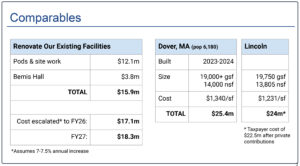 Although the community center vote played second fiddle at the March 23 Town Meeting, voters approved design and construction of the $24.02 million facility on the Hartwell campus by a margin of 81%–19%, easily clearing the two-thirds threshold required. But the margin was much closer at the March 25 election, where a simple majority was required: 935–699 in favor (57%–43%).
Although the community center vote played second fiddle at the March 23 Town Meeting, voters approved design and construction of the $24.02 million facility on the Hartwell campus by a margin of 81%–19%, easily clearing the two-thirds threshold required. But the margin was much closer at the March 25 election, where a simple majority was required: 935–699 in favor (57%–43%).
To pay for the community center, the town will borrow $15.77 million. The balance will be funded with $4.75 million from the town’s Stabilization Fund, $2 million from free cash, and $1.5 million in donations — $1 million from the Friends of the Council on Aging and $500,000 from the Ogden Codman Trust. The project has also received another $340,000 in individual donations.
For the owner of a median-value home in Lincoln ($1.43 million), the borrowing will result in a fixed tax increase of $472–$500 each year for the life of the 30-year bond. The town has several property tax relief programs for qualifying residents — including the newly approved circuit-breaker relief program (see Article 10 below). Click here to see a gallery of conceptual designs by ICON architects.

Left: costs to fully renovate the pods and Bemis Hall. Right: a comparison with the csts and size of a similar community center project in Dover (“gsf” is gross squre feet and “nsf” is new square feet). Click image to enlarge.
If the project had been voted down, it would have cost $18.3 million in fiscal 2027 dollars to fully upgrade the Hartwell pods and Bemis Hall for the Parks and Recreation Department and the Council on Aging & Human Services, respectively, according to Community Center Building Committee member Jonathan Dwyer (see table at right).
A few residents argued the project was too expensive and the money could be used for other projects on the horizon including new water mains. But residents including Gwyn Loud urged approval. Referring to previous capital projects like the Town Hall renovation, the Codman Pool, and the library extension, “we’re paying it forward by looking back,” she said. “We knew it was for the good of the future.”
A total of 541 residents voted on the measure, down from 814 votes cast on the previous article on HCA zoning.
Other Town Meeting results
After the high drama of the HCA zoning issue where 819 residents voted (and attendance at its peak was 914, according to the Town Clerk’s office), all the other warrant articles passed quickly and unanimously. Some highlights:
Bright Light Award (Article 6)
Presented to Karen Boyce, for her “devoted leadership of the Lincoln Food Pantry.”
Voting clickers (Article 6)
$35,000 approved for purchasing 1,200 clickers to speed up voting at Town Meetings. The clickers, which can instantly record and report yes/no, multiple choice, and ranked choice votes, are used by about 80 other towns in Massachusetts. Still to be determined: exactly under what circumstances to use them. For example, will it be for all votes or just those in which a floor vote is inconclusive? Will the record of how each person voted be public, as other votes at Town Meeting are? What changes in town bylaws will be necessary?
Town moderator Sarah Cannon Holden and Select Board Chair Jim Hutchinson will convene a forum later this spring to discuss these issues and the conduct of Town Meetings in general.
Property tax circuit breaker (Article 10)
Five years ago, the Property Tax Study Committee (PTSC) was formed to look at ways to ease the burden on limited-income residents and preserve economic diversity after the town raised property taxes by almost 15% to pay for the $93 million school project. Last week’s Town Meeting approval finally put in place a program to shift 1% of the tax levy away from qualified homeowners (those who demonstrate certain criteria around income, assets, age, and length of time they’ve lived in Lincoln) to owners of the most expensive properties.
In May 2021, voters finally approved a home-rule petition to the legislature that would allow the town to implement its own tax circuit breaker program in addition to those offered by the state. The legislature approved the bill only very recently, and (with a nudge from Town Moderator Sarah Cannon Holden, according to PTSC chair Jennifer Glass) Gov. Maura Healey signed it the night before Saturday’s Town Meeting.
The program must be reviewed and put to a vote for renewal every three years.
Water Department (Article 26)
Voters approved bouncing $2.2 million for the first of a five-phase project to replace the town water main running from Bedford Road to Codman Road. Aside from leaks, the insides of the old mains are so encrusted with mineral deposits that their diameter has narrowed to the point that not enough water can get through in a fire emergency. After water pressure testing for the school project, engineers found that an expensive booster pump had to be installed.
Leave a Reply